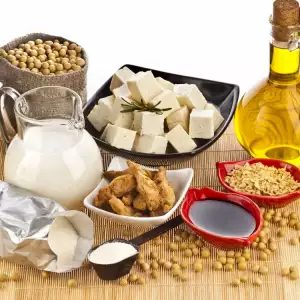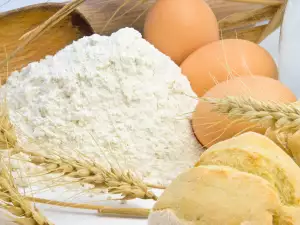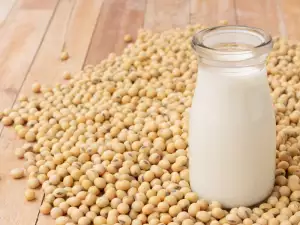Soy milk is a milky drink that is extracted from soy beans. As soybeans, soya milk comes from China, a region where soybeans grow completely naturally and have been used as food long before there was the first written evidence of it. Soya milk has nothing to do with real milk and its name in Chinese "doudzyan" means juice from soybeans. Soya milk comes from soya beans soaked in water, which are mixed with water and the resulting slurry is pressed and filtered. The drink is called soya milk.
The production of soybean products in China dates back to time immemorial. Especially for soya milk, the earliest evidence of its consumption is a mural, which clearly shows a kitchen in which they make soya milk and cheese. This mural dates back to the Han Dynasty, which managed China between 25 and 220BC. In the 16th century, the poet Su Pin wrote his "Ode to Tofu". The earliest European development for soya milk is from the 17th century.
Composition of soya milk
Soy milk is very nutritious. Like cow milk, it has about 88.6% water content, but the has about 50% more protein, the composition of which includes all eight essential number of amino acids. In addition, soya milk contains 16% less carbohydrates, 24% less fat, whole 15 times more iron and many other important vitamins. Soy milk has a lot less calories than cow, but it lacks cholesterol and lactose.
It is a valuable source of vitamin E and lecithin. Pesticides and other agricultural chemicals in it are about 10 times lower than it in cow's milk. Soy milk provides vitamins of the B group, unsaturated fat, prebiotic sugars raffinose and stahiosa. In soy milk, there is no milk sugar, which makes it suitable for people with lactose intolerance.
Selection and storage of soy milk
Soy milk can be purchased both natural and sweetened in different flavors /chocolate, vanilla, etc./ from a number of organic shops and larger grocery chains. It is still gaining more and more supporters.
In China, however, it is sold everywhere, most often in stores for bakery snacks. There are hot and cold types. Buy soy milk with guaranteed origin and quality, pay attention to the label on which the expiry date and manufacturer shall be specified. Store soy milk according to package directions.
100 g of soy milk contains 45 calories, 3.7 g protein, 2.2 g fat, 0 g cholesterol, 120 mg calcium, 0.6 g fiber, 0.06 g sodium, 2.4 grams of carbohydrates.

Cooking with Soy Milk
Soy milk has a different flavor than cow's milk. In some cases, the taste is quite unacceptable for people. That requires frequent flavoring with fruit, vanilla or chocolate, which makes it easier to eat. Soya yogurt has a mild flavor, making it a better choice than regular soya milk. Soy milk is an excellent substitute for animal milk, which makes it a suitable replacement in all recipes - from cakes to savory dishes.
Soy milk can be prepared at home. To do this, you need fresh soybeans that are soaked in fresh water for several hours. Puree and drain, and the resulting liquid is heated for a short time to a temperature of about 135-150 degrees. The best thing is to prepare your own soy milk, because it is more useful than what is sold in stores. If you want to cook soy yogurt, add 1 tablespoon dill, which will serve as starter food for the bacteria.
Benefits of soy milk
Due to the different nutrients that are present in soy milk, it is considered a good therapeutic product. Many Japanese scholars recommend it for diabetes, anemia, hypertension and cardiovascular disease. Soy milk is rich in isoflavones - natural phytoestrogens that have a positive effect on the heart and immune system. They also have anti-cancer and anti radical action, bettering your mood and tone. We have already mentioned that soy milk is an excellent alternative for those who suffer from lactose intolerance.
According to some recent studies, soy milk is very beneficial for the liver. Soy proteins that are found in it help reduce harmful fat accumulated in the liver by approximately 20%. It is clear that soy has a protective effect against the development of fatty liver disease.
Dietary protein and fiber in soy milk help to reduce levels of bad cholesterol and triglycerides. It is believed that consuming two cups of soy milk a day relieves hot flashes during menopause.
Dangers of soy milk
Although soy milk has positive health effects, it poses a number of health risks. First is the danger of too much phytic acid, which can not be destroyed by heat treatment. This acid hinders the absorption of many important metal ions - calcium, zinc, iron, manganese and others.
Furthermore, soybeans contain substances that inhibit the absorption of essential vitamins - A and B1. The result is a negative impact on the thyroid. In many cases, there are allergic reactions that are caused by soy protein.
Despite its nutritious properties, soya milk can’t replace cow's milk completely.
According to some recent studies, it appears that soy milk is bad for your teeth. Bacteria in soya milk produce 6 times more acid than dairy. For this reason, dentists do not recommend soya milk for small children, because the effect on your teeth is strongly negative.




















Comments